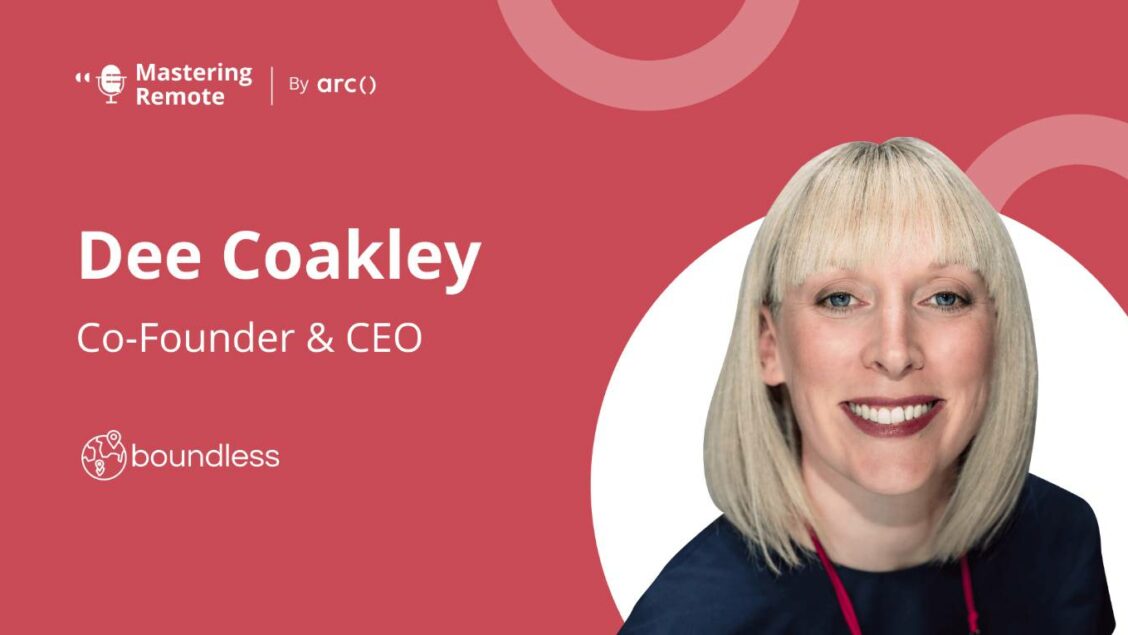Hiring remote employees internationally? You might want to figure out how to deal with legal employment, local payroll, and taxes before getting into trouble.
This episode’s guest, Dee Coakley, faced exactly this problem in her previous experience as COO, which led her to co-found and head Boundless as CEO. She breaks down how to minimize the risks when hiring remotely, explains what an Employer of Record is, and shares why using one can give your organization a competitive edge in hiring remote workers.
What you’ll learn in this episode of Mastering Remote:
- Know when you should be hiring remote workers as remote employees versus contractors
- How compliance can actually help you recruit and retain great team members
- How to evaluate an Employer of Record before selecting one
Post Contents:
- Hiring Remote Employees: What Is An ERO?
- Employee vs Contractor: Why It Matters for Employing Remote Workers
- Governments Have The Final Say In Remote Employee Classification
- Be Aware: Staff Mobility Also Comes With Risks
- Employment As A Recruitment And Retention Tool
- How To Select Your EOR
- Additional Episode Information
Looking for top talent fast? See how Arc can help you:
⚡️ Find developers, designers, marketers, and more
⚡️ Freelance or full-time remote + fully vetted
⚡️ Save up to 80% with global hires
Hire top talent with Arc risk-free →
Hiring Remote Employees: What Is An ERO?
If you have remote employees, you need to get you head around international employment, payroll, taxes, and more.
Boundless grew from a problem that Dee faced when running people ops for a multi-national company with people working remotely:
I knew enough to know that I had to process payroll through those countries.
You can’t simply keep someone on the payroll of the company’s HQ country or have them under an employment agreement that’s compliant with the terms of that country, but perhaps in conflict with the terms of the country where the person is living.
I set about trying to resolve these issues and figure out an easy way to set these people up compliantly. And the truth is there was no easy way.
How to use an EOR for remote work
Dee created Boundless as an Employer of Record (EOR) product to help other companies with remote employees. Haven’t heard of an EOR before? An EOR is a company with an entity physically based in a country that helps you employ someone physically located there (i.e. someone working remotely).
Essentially, you recruit the future remote employee, then make an agreement with the EOR. The EOR has:
- An employment contract with the person you want to employ (remote employee)
- A service provision contract with you
Boundless’ website says this “means that Boundless is the legal employer of the individual, as far as their government, tax, and employment authorities are concerned.” But while the EOR employs the individual directly, your company instructs the individual in their daily work.
For example, Boundless 100% owns the legal entities in each country they support, and is fully responsible for compliance:
It’s a compliance product. In our minds, you can’t cut corners here. You need to make sure you’re delivering quality, and you are genuinely delivering full compliance and giving real assurances to the customer.
So we own all of our own infrastructure in each of the countries where we support workers. We go through quite a process to get set up for each country.
But as the Employer Of Record, we own a local entity. We’re registered with the local tax authorities and so on. And that means then that we can act as an employer on our customer’s behalf.
Read More: How To Build Your DEI Hiring Strategy In 2022
Key attributes of an Employer of Record
Some of the key attributes of an EOR include:
- The EOR has a fully-owned legal entity in the country
- The EOR has local bank accounts in the country
- The EOR is registered with the local tax authorities as an employer
- If required, the EOR is licensed in that country
- The EOR has a team of specialist advisors helping them stay compliant
- The EOR offers locally-compliant employment agreements
- Specialist knowledge of the country in question
(An EOR is different from a Professional Employer Organization, which is a co-employment model, offering assistance with HR/payroll functions. With a PEO, you are the employer of the remote employee, and need to ensure compliance in the country of employment. Note: PEO and EOR can be used interchangeably in some countries, so keep an eye out!)
Employee vs Contractor: Why It Matters for Employing Remote Workers
For growing companies, contractors are a great way to scale their workforce fast. Particularly for growing remote teams, contractors can be a quick way to hire the talent you need, regardless of where they’re physically located.
For startups, especially, speed of hiring can be very important in the early stages of the company. But Dee pointed out that when it comes to funding rounds and exits, compliance to employment laws can be particularly important. According to Dee, employing through an ERO can help make sure you side-step these issues from the start.
But what are some of these issues? Read on.
Read More: Good Developers Don’t Always Make Good *Freelance* Developers
Governments Have The Final Say In Remote Employee Classification
Fixed-term projects are the classic use of contractors — but more and more remote teams are employing work-from-home contractors on a long-term basis. Dee warns that this approach can have some risks:
If someone’s with you long-term and full time, and they’re really part of your team — if they have a company email address, and they attend your internal meetings — most governments will classify that worker as an employee.
Additional potential attributes of “employees”
When it comes to deciding that a contractor is actually a remote employee, Dee said the rules for every country are different. She told us some other risk factors for governments automatically classifying a contractor as a remote employee include:
- If the work is full time
- If the contractor only has one client
- The length of the work engagement
Governments across the world are paying increasing attention to the issue of employee vs contractor classification. Dee pointed out a recent campaign in Serbia where the government reached out to companies and gave them a deadline to ensure their staff was appropriately classified.
Read More: 10+ Things to Consider BEFORE Hiring a Freelance Software Developer
Be Aware: Staff Mobility Also Comes With Risks
One of the best employee-side benefits of remote jobs is the ability to move location. But if you’re the employer, you need to make sure you know where your employees are!
Dee shared another consultant’s story: a remote salesperson had moved from the UK to Ireland without telling the employer, and continued to work remotely. The employer continued to pay UK taxes to the UK government. The outcome, once everything came to light?
Fines were imposed. A company can’t feign ignorance when it comes to things like this — and with remote workers, of course, it’s very difficult to be absolutely certain about where these people are if they’re just on the end of the video screen every day.
But you, as an employer, do have an obligation to know where your people are, and to comply with the regulations of the territory that they live in (and where they’re tax residents.)
The takeaway: if you have a workforce working remotely, ensure you know where they are, and have taken the necessary steps to get them set up in their country of residence.
Employment As A Recruitment And Retention Tool
A major benefit to using employment over contracting is cultural: by employing the talent, it creates a different work relationship:
Companies being able to speak to those workers and say, you know what? We really value you. We want to have you categorized as an employee. We want to pay employer taxes for you. We want to facilitate you paying into your local social security.
Next, we want to pay into your pension. And we want to align the benefits that you get with these other workers that are our employees…
Dee told us that choosing to make these people remote employees, rather than contractors, is also a recruitment and retention tool for companies. Why? It makes them feel valued, and actually part of the team.
Talent is everything. And I think any founder will understand that. And if you want to have the very best team in the world, you need to be open to employing from anywhere in the world… And a lot of really good people want to be employees.
It can be quite cultural, as some countries, employment is a lot more attractive than contracting for workers. So, to attract and retain the very best people, offering them secure, stable employment and good benefits makes a whole lot of sense, and you’ll see the returns in terms of your business.
Read More: Freelance Developer Hiring Guide 2022: Salaries, Rates, Skills & More
How To Select Your EOR
So you’ve found the person you want to employ (rather than have as a contractor), but they live in another country. Or maybe you’re looking to convert your existing remote work contractors to become remote employees. Or maybe your staff have relocated and you want to keep them.
If you don’t want to go through all the steps required to set up your business formally in that country, an EOR or PEO may be the way to go. First, according to Dee, you’ll need to talk to the potential EOR/PEO, and clearly explain your position:
Whoever you’re speaking to should be able to answer questions that you have around the employment regulations for the country that you’re looking at, and the tax regime of the country that you’re looking at — they should be very open with information.
Next, Dee says to consider the structure of the EOR/PEO and its service offer:
I would ask about the infrastructure and does this company own the infrastructure that your worker will be employed through?
Dee points out that if the company doesn’t directly own the on-the-ground employment infrastructure, this is introducing further partners into the agreements. So there may, for example, be third-party company names on the employment contract with your new remote work hire.
Dee suggests you ensure that you have clear information about these structures, as “you need to be able to really, really trust these people.”
Read More: 4 Important Remote Hiring Fundamentals From First-Hand Experience
Additional Episode Information
About Dee Coakley and Boundless
Dee Coakley is the CEO and Co-founder of Boundless. Previously a 3 times COO, she has spent the last 10 years building B2B SaaS businesses and has experienced the operational challenges of setting up remote teams firsthand.
Boundless is the international employment platform for remote teams. It takes the hard work out of remote people ops by allowing companies to compliantly employ people wherever they are, and to get set up to handle payroll & tax filings in minutes.
Rapid-fire questions
- What’s the first thing you do in the morning? Dee walks her dog — a great way to get mentally set up for the day! She then plans her day at her desk.
- What’s your favorite way to take a break? Walking, getting out in nature.
- Who’s the most interesting person you follow on Twitter? Data scientists and epidemiologists. (Dee likes following people from outside her immediate field, and diversifying her Twitter feed. She also likes her friend Gavin Sheridan’s curated list of people worth following.)
- Do you have a favorite newsletter? Dee doesn’t tend to sign up for newsletters, but she does read Morning Brew.
- Is there any non-obvious tool that you swear by? Coda, for documentation and collaboration. (She also likes Asana.)
- If you were not in the world of business and operations, what job would you love to do? In her 20s, Dee worked in the music industry. If she wasn’t in her current role, she thinks she’d probably be working in artist management.
Disclaimer: This post is designed to give you a summary of the podcast episode discussion only, and should not be relied upon. When hiring, ensure you seek professional advice specific to your situation.
You can also try Arc, your shortcut to the world’s best remote talent:
⚡️ Access 450,000 top developers, designers, and marketers
⚡️ Vetted and ready to interview
⚡️ Freelance or full-time








